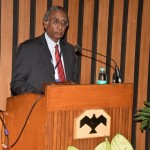Chairman’s Remarks by Ambassador Rajiv Bhatia, Distinguished Fellow, Gateway House, Mumbai at ‘Regional Conclave on ASEAN@50 and India-ASEAN Relations’ (NIAS, Bengaluru, 7 December 2017). He also gave the keynote address for the panel on ‘ASEAN Today: Introspection and Prospects’. Read more about the event here.
I join my colleagues in NIAS and SEARG to extend a warm and friendly welcome to you all. I also bring to you the greetings of Ambassador Lalit Mansingh, Chairman of Kalinga International Foundation and former foreign secretary.
A creative synergy amongst several institutions has made this Conclave possible. I am particularly delighted that it takes place at a great institution – the Indian Institute of Science – and in an intellectually stimulating city – Bengaluru.
In the five decades since its establishment in 1967, ASEAN has emerged as a highly successful regional institution, serving as an instrument of political cooperation, a platform for dialogue among communities, and a tool for economic integration. It is also the architect of, the much discussed and even more lauded, “ASEAN Way.”
ASEAN is the world’s sixth largest market (at the start of 2017) and the third largest labor force. It has been projected to become the fourth largest economic bloc by 2030.
It has the vision to develop as a concert of Southeast Asian nations, transforming a multi-faceted partnership into three communities or three pillars of a single community – the ASEAN Community.
First, there is the ASEAN Political-Security Community (APSC) that aims to ensure that countries in the region live in peace with each other and the world – in a just, democratic and harmonious environment.
Then, there is the ASEAN Economic Community (AEC). Its establishment is a major milestone in the regional economic integration programme, offering the enticing opportunities of a huge market of US $2.6 trillion and over 622 million people.
Finally, the ASEAN Socio-Cultural Community (ASCC) is people-oriented and socially responsible, geared to promote unity, harmony and inclusiveness as well as to forge a common identity among its people.
The ASEAN Community is not yet a complete reality; it is a work in progress.
About ASEAN’s journey in the past, it is worth recalling that for 17 years it was a grouping of only five nations; for the next 11 years, it was a grouping of six nations, and then with the entry of CLMV countries during 1995-99, it became a grouping of ten nations. It is now at the centre of numerous regional institutions that bring together a host of nations from within and outside East Asia.
This Conclave is an apt forum to reflect objectively on a) the balance sheet of ASEAN in the past 50 years and b) future prospects of the Association-Community in the coming five decades when geopolitics, geo-economics and technology are set to coalesce in order to bring about unprecedented change in the lives of the nations and people.
Finally, our task includes another serious cerebral exercise, namely to undertake purposeful brain-storming to assess the 25 years of institutionalized relationship between ASEAN and India: 25 years of dialogue partnership, 15 years of summit partnership, and 5 years of Strategic Partnership. What has it achieved? Could it have achieved more? What should be the goals and priorities for the next 25 years? These and many other questions will engage the bright minds assembled here today.
I wish you all a rich and interesting intellectual feast!
Rajiv Bhatia is Distinguished Fellow, Foreign Policy Studies, Gateway House
You can read exclusive content from Gateway House: Indian Council on Global Relations, here.
For interview requests with the author, or for permission to republish, please contact outreach@gatewayhouse.in.
© Copyright 2017 Gateway House: Indian Council on Global Relations. All rights reserved. Any unauthorized copying or reproduction is strictly prohibited


